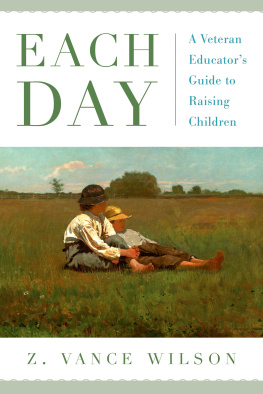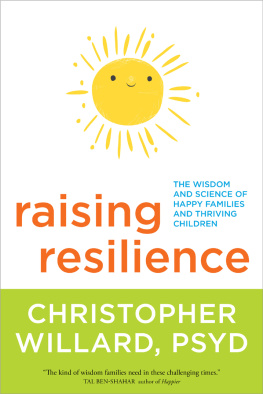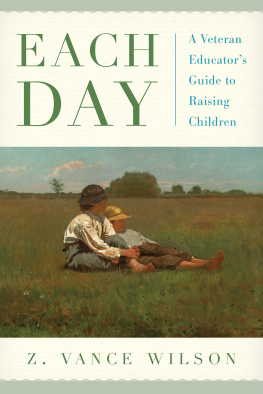Z. Vance Wilson - Each Day: A Veteran Educators Guide to Raising Children
Here you can read online Z. Vance Wilson - Each Day: A Veteran Educators Guide to Raising Children full text of the book (entire story) in english for free. Download pdf and epub, get meaning, cover and reviews about this ebook. year: 2016, publisher: Rowman & Littlefield, genre: Romance novel. Description of the work, (preface) as well as reviews are available. Best literature library LitArk.com created for fans of good reading and offers a wide selection of genres:
Romance novel
Science fiction
Adventure
Detective
Science
History
Home and family
Prose
Art
Politics
Computer
Non-fiction
Religion
Business
Children
Humor
Choose a favorite category and find really read worthwhile books. Enjoy immersion in the world of imagination, feel the emotions of the characters or learn something new for yourself, make an fascinating discovery.
- Book:Each Day: A Veteran Educators Guide to Raising Children
- Author:
- Publisher:Rowman & Littlefield
- Genre:
- Year:2016
- Rating:4 / 5
- Favourites:Add to favourites
- Your mark:
- 80
- 1
- 2
- 3
- 4
- 5
Each Day: A Veteran Educators Guide to Raising Children: summary, description and annotation
We offer to read an annotation, description, summary or preface (depends on what the author of the book "Each Day: A Veteran Educators Guide to Raising Children" wrote himself). If you haven't found the necessary information about the book — write in the comments, we will try to find it.
Each Day: A Veteran Educators Guide to Raising Children — read online for free the complete book (whole text) full work
Below is the text of the book, divided by pages. System saving the place of the last page read, allows you to conveniently read the book "Each Day: A Veteran Educators Guide to Raising Children" online for free, without having to search again every time where you left off. Put a bookmark, and you can go to the page where you finished reading at any time.
Font size:
Interval:
Bookmark:
Each Day
Each Day
A Veteran Educators Guide to Raising Children
Z. Vance Wilson
ROWMAN & LITTLEFIELD
Lanham Boulder New York London
All permissions and copyright information appear at the end of the book.
Published by Rowman & Littlefield
A wholly owned subsidiary of The Rowman & Littlefield Publishing Group, Inc.
4501 Forbes Boulevard, Suite 200, Lanham, Maryland 20706
www.rowman.com
Unit A, Whitacre Mews, 26-34 Stannary Street, London SE11 4AB
Distributed by NATIONAL BOOK NETWORK
Copyright 2017 by Z. Vance Wilson
All rights reserved. No part of this book may be reproduced in any form or by any electronic or mechanical means, including information storage and retrieval systems, without written permission from the publisher, except by a reviewer who may quote passages in a review.
British Library Cataloguing in Publication Information Available
Library of Congress Cataloging-in-Publication Data Available
978-1-4758-2776-7 (cloth)
978-1-4758-2777-4 (electronic)
 The paper used in this publication meets the minimum requirements of American National Standard for Information SciencesPermanence of Paper for Printed Library Materials, ANSI/NISO Z39.48-1992.
The paper used in this publication meets the minimum requirements of American National Standard for Information SciencesPermanence of Paper for Printed Library Materials, ANSI/NISO Z39.48-1992.
Printed in the United States of America
To my children, Evan and Emily Wilson
And in memory of my father, mother, and brother
Contents
Foreword
David Ignatius
I n medieval times, scholars sometimes spoke of a great chain of being, which described the faith and traditions that had been passed from generation to generation. Boys preparatory schoolsmodern survivors of medieval timeshave something similar in the body of knowledge thats passed from headmaster to headmaster. This accumulated wisdom may seem to outsiders as arcane as a spell from Hogwarts, but its an encyclopedia of life.
The headmaster in the years I was a student at St. Albans, Canon Charles Martin, wrote missives home to parents (and boys, but we got the message orally several times a day). They were eventually gathered into a book, Letters from a Headmasters Study . His basic admonition to boys and parents alike was that they should seek admission to the Kingdom of Heaven, not the kingdom of Harvard. Woe unto those who got the applications mixed up. Canon Martin rarely referred to Jesus by name; instead, he spoke simply of the Teacher.
I think of this collection of essays by Vance Wilson, the current headmaster of St. Albans, as a successor to Canon Martins book. It is a link in our great chain of being. Its about the permanent thingsthe values we try to teach our children or, if were lucky, that we encounter in an educator like Charles Martin or Vance Wilson.
The New Yorker writer John McPhee wrote a book, called The Headmaster , about Frank Boyden, who was head of Deerfield Academy for sixty-six years. Boyden, he said, was part of a skein of magnanimous despots... who created enduring schools through their own individual energies. Vance Wilson is part of that skein, too. Hes too modern a man to seem autocratic, and headmasters these days can get sued if they let their inner despot become too obvious. But Boyden would recognize Wilson as a member of his own ancient fraternity of educators who teach boys to become men by emphasizinginsisting uponvalues that endure.
Boyden explained to McPhee how he ran his school: My philosophyI cant express it, really: I believe in boys. I believe in keeping them busy, and in the highest standards of scholarship. I believe in a very normal life. It generally seeps in. I try to do the simple things that a well-organized home does for its boys.
A similar humility and belief shapes these essays. As headmaster, Wilson thinks carefully about what boys must understand about life if they are to become whole, morally and intellectually. He leans against the ephemeral values that surround his students and tries to communicate what is real and enduring. Hes their last chance, in a sense, before theyre buried by college and adult life.
In these letters, speeches, and homilies, Wilson shares the things he has learned from books, prayer, and his own boyhood in the mountains of North Carolina. He writes from the heart, always: about how prisoners manage to survive unspeakable captivity; about the motivations of the anonymous hero who reaches out to save others in a freezing river, giving up his own life; about listening to the stars in what feels like an empty universe.
Wilson writes about the particular things that are essential knowledge at a boys school: what real toughness is; what makes boys different from girls; why boys need to choose their band of brothers wisely. He describes the enduring, unfair, but inescapable attraction of the wayward prodigal son, compared to his virtuous, dutiful older brother; he explains the need in our lives for laughter, even the teasing, occasionally cruel kind that is an eternal feature of prep-school life; he asserts the value of silence (turn off your cell phones!). One of the most important essays in this book explains why high-achieving parents must avoid poisoning their children with too much love and ambition. (He aptly cites the old saw: The easiest way to kill a houseplant is to overwater it.)
Wilson turns often to the Bible for his stories. Hes not an ordained minister, unlike most of his St. Albans headmaster predecessors, but he sometimes thinks like one. He writes often about prayer; he cites stories about Jesus and other passages from scripture. He is rooted in his faith tradition, but not insistent on it. As someone once said of the Episcopal Church, his faith is solid at the core but loose at the edges. I think thats part of why St. Albans works: It can reach for universal values because it stands firmly in its own traditions.
Wilson loves good writing, as the reader will see from his own evocative prose and the writers he cites. Some are from his beloved South, such as Thomas Wolfe and Flannery OConnor; others are modern writers, like poets Richard Wilbur or W.H. Auden, or the playwright Arthur Miller; some are immortals like Homer and Dostoyevsky. Wilsons most moving piece of exegesis may be his reading of Maurice Sendaks Where the Wild Things Are . This rich, diverse literary culture is part of the great chain of being that Wilson embodies.
My favorite passages in this book are the stories from Wilsons childhood in Asheville, North Carolina. He remembers the texture of his boyhood: reading the Bible, failing exams, learning at the feet of his father and his hero grandfather, who was a country railroad conductor evidently beloved by every passenger. The most moving stories are about Wilsons favorite Uncle Turk, a charismatic combat veteran of World War II who suffered from alcoholism.
Wilson never brags about himself. You wouldnt know from these essays that he was a star basketball player at Yale. The implicit lesson is that real men dont brag.
Wilson celebrates many sons of his school, great achievers like the actor Jeffrey Wright or the Hall of Fame pro football star Jonathon Ogden. But he gives special place to a St. Albans graduate who died in service to his country: James Harvey Gaul, who parachuted behind German lines as an O.S.S. intelligence officer in World War II and was captured and killed.
In these essays, you will enter a St. Albans School that is a very particular place. It is unapologetically an Episcopal Church school, in the shadow of the inspiring, humbling Washington National Cathedral. Its a place where students get used to the peal of bells from the great tower of the cathedral, and ingest at chapel services the hymns of the fat Episcopal Hymnal and the thinner Book of Common Prayer. Habit can become faith: When my first grandchild was born, and I was trying to sing her to sleep, I found myself singing the hymns I had sung every morning as a boy. My little granddaughters earliest memories may be the words, Turn Back, O Man!
Next pageFont size:
Interval:
Bookmark:
Similar books «Each Day: A Veteran Educators Guide to Raising Children»
Look at similar books to Each Day: A Veteran Educators Guide to Raising Children. We have selected literature similar in name and meaning in the hope of providing readers with more options to find new, interesting, not yet read works.
Discussion, reviews of the book Each Day: A Veteran Educators Guide to Raising Children and just readers' own opinions. Leave your comments, write what you think about the work, its meaning or the main characters. Specify what exactly you liked and what you didn't like, and why you think so.









